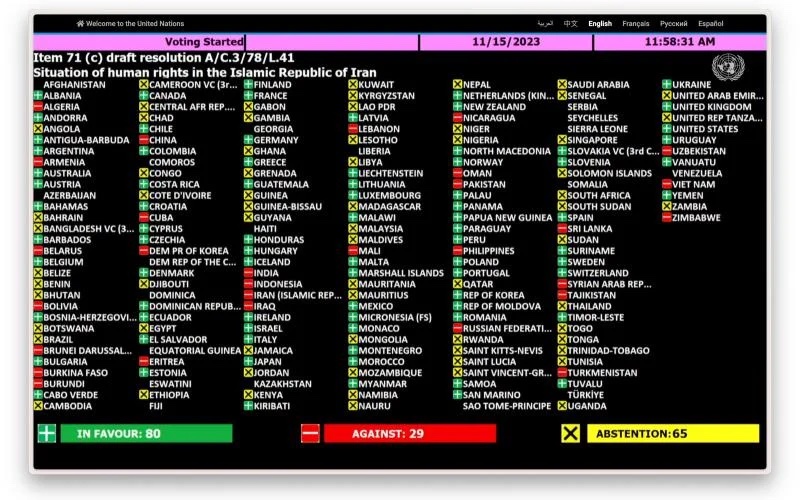Source: www.bic.org

NEW YORK—15 November 2023—Yet again and for the 36th time, a United Nations (UN) General Assembly resolution expressing serious concern over the situation of Baha’is in Iran and other religious minorities, and calling on the Iranian government to “eliminate” all forms of religious discrimination and persecution, passed today at the Committee on Social, Humanitarian and Cultural Issues, also known as the Third Committee.
The resolution, introduced by Canada and 50 co-sponsors from all regions, passed by 80 votes in favor, with 65 against and 29 abstentions, and will be confirmed during a plenary session of the United Nations General Assembly next month.
Many UN Member States called for the rights of religious minorities to be respected by Iran’s government. And Brazil said it “remains troubled by reports of violations against women, human rights defenders and religious and ethnic minorities. We take this opportunity to reiterate our support to the right of the Baha’is to exercise their faith freely and peacefully in Iran.”
The resolution “expresses serious concern” over a litany of human rights violations in Iran—including the denial of the freedom of religion or belief. Baha’is “in particular” are subject to “undue restrictions on burials carried out in accordance with religious tenets, attacks against places … burial and other human rights violations,” which include “increased harassment, intimidation, persecution, arbitrary arrest and detention” and incitement to hatred through official and unofficial media that may “lead to violence.”
Iran’s government is also urged to “end ongoing systemic impunity for those who commit crimes against persons belonging to recognized and unrecognized religious minorities” while addressing constitutional arrangements, laws and practices entrenching the denial of education and employment for Baha’is, the closure of independent businesses and shops, the confiscation of properties, and other rights violations.
“Even as the UN General Assembly’s Third Committee considered the human rights situation in Iran, the Islamic Republic has persisted in grave violations against the Baha’i community,” said Bani Dugal, the Baha’i International Community’s Principal Representative to the United Nations. “Iranian Baha’is are the targets of an escalating and intensifying wave of persecution. More than 30 Baha’i homes were invaded last week in a series of violent raids, some targeting elderly and ailing women, and many individuals were arrested as part of the crackdown. And in October, 26 Baha’is were sentenced to a total of 126 years in prison as 10 Baha’is were arrested in Isfahan, all of them women, and three others in Yazd.”
“When will this stop? Iranians have suffered the abuses of their government for 44 years. The international community must insist—and find new ways to force its insistence—that Iran comply with its international legal obligations and end this vicious campaign of suffocating a peaceful and innocent religious community,” Ms. Dugal added.
International attention on the Iranian government’s 44-year campaign of systematic persecution of Baha’is has risen among UN officials, national governments and media outlets, with several interventions at the United Nations and by national governments.
A report by UN Secretary-General António Guterres said “members of the Baha’i minority were subjected to human rights violations for practicing their faith” and called on the Iranian government to “protect all rights of all persons belonging to ethnic and religious minorities, and address all forms of discrimination against them without delay.”
On 26 October, the UN Special Rapporteur Javaid Rehman said in a presentation to UN Member States that “there has been a marked increase in attacks targeting and harassment of the Baha’i [community] … including cases of arbitrary detentions, interrogations, unlawful arrest, torture, ill treatment, destruction of properties, cemetery desecration, denial of education rights and other forms of economic pressures.”
UN Special Rapporteur on minority issues, Fernand de Varennes, also noted that the Baha’is in Iran have been subjected to increased levels of hate speech on social media.
Last month the Baha’i International Community also published an updated edition of “The Baha’i Question: Persecution and Resilience in Iran,” a resource document for policymakers working to press the Iranian government to abide by its international human rights obligations. The new publication gives a detailed account of Iran’s treatment of Baha’is, showcases dozens of official policy documents that frame the campaign to “block their progress and development,” and highlights the ongoing denial of higher education.
Iran’s disregard for human rights was evident during Iranian President Ebrahim Raisi’s visit to the UN General Assembly last month. Mr. Raisi and other senior government officials have always denied the violation of the rights of Baha’is and others in Iran—even as there is mounting evidence refuting their claims.
Baha’is are Iran’s largest non-Muslim religious minority. The latest arrests and jail sentences, as well as the detaining of a 90-year-old Baha’i man who had already spent 10 years in prison, and the targeting of 180 more, have occurred in the context of the global #OurStoryIsOne campaign, launched in July 2023 to commemorate the execution of 10 Baha’i women in 1983 and to support the wider Iranian effort to achieve justice and equality. The campaign attracted unprecedented levels of solidarity inside and beyond Iran.
Leave a Reply